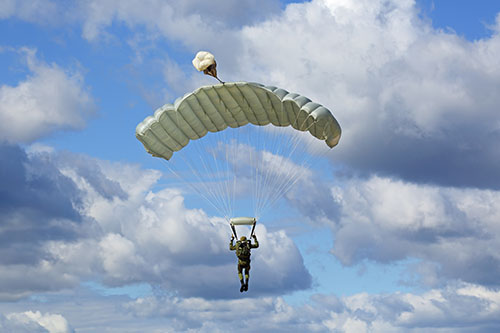- Local: (516) 346-4636
- Toll-Free: (800) 886-6060
- Fax: (516) 346-4366
- Email: kflynn@nationalwebbing.com
Webbing is used today in a wide variety of products, from zippers to backpacks to pet collars. It consists of a flat strip or tube of woven fabric designed to be lightweight yet durable. Military webbing is one of the toughest types of webbing available. Used in parachutes, packs, cargo nets, and other important gear, military webbing has many features that distinguish it from average nylon webbing.

Mil spec webbing has to be strong enough to haul heavy loads under harsh conditions. It is extremely strong and durable: webbings with 1-2 inch widths have breaking strengths that can range between 5,000 and 10,000 pounds, with some that are even stronger. When there are lives depending on the strength of the webbing, there has to be no doubt that it will hold under any circumstances.
MaterialMost military webbing is made of nylon or Kevlar. These both make strong, lightweight webbings suitable for most military uses, with Kevlar being the stronger of the two. Another related product sometimes used in military webbings is Nomex. While not as strong as Kevlar, Nomex is more resistant to damage by heat, fire, and chemicals, which makes it essential in many military applications.
Normal grade webbings used in items like furniture and belts are typically made out of materials such as cotton or polyester. While often less expensive and more readily available, these types of materials are not designed to stand up to the rigors of military use. Nylon webbing can be found in items like seat belts and climbing gear where there is a need for extra strength.
Resistance to AbrasionIn addition to its ability to carry heavy loads, military grade webbing is also designed to resist abrasion. It rarely tears or gets worn down, even under extreme conditions. This is despite the fact that it is typically ribbed (not smooth like some types of webbing) to give it better traction and make it less likely to slip in tie-downs or buckles.